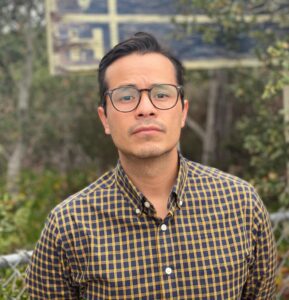
UC Santa Cruz graduate student Nathan Osorio received a 2022-2023 Humanities Institute Public Fellowship to work with UC Press for the duration of the school year. He is the recipient of the Poetry Society of America’s 2020 Chapbook Fellowship for his collection, The Last Town Before the Mojave. His poetry, translations, and essays have also appeared in BOMB, The Offing, Boston Review, and Public Books. The goal of the fellowship is to facilitate professional development opportunities for graduate students in the humanities and for Fellows to contribute to research, programming, communications, and other work at non-profit organizations, companies, and cultural institutions.
In this interview, Nathan speaks with Senior Acquisitions Editor Kate Marshall about his work at the press.
Nathan, can you tell us a little about your background and what you are doing as a grad student at Santa Cruz?
Hello! I’m a PhD candidate in Literature and Creative/Critical Writing at the University of California, Santa Cruz. My research examines the different ways Latinx artists use form breaking and transdisciplinary methods in their creative practices. For instance, I look at the way the poet Anthony Cody transforms his poems into visual collages of archival material and how the Undocupoets organize for universal access to poetry contests alongside their own writing practices. By invoking multimodal strategies like performance, aurality, installations, and labor actions, these artists trouble US-Eurocentric forms and textuality, which have historically been used to oppress colonized communities. I find that these artists make work that invites readers to reimagine the legacy of the 1492 colonial encounter and to speculate ways we might liberate ourselves from it in the future. My scholarly research is unique in that I use both critical and creative writing to analyze cultural productions while processing my own family’s migration to the United States in the 1980s and how that experience shaped my life.
Since you are actively writing your dissertation, can you tell us a little about your decision to apply to be a Fellow at UC Press?
I was drawn to UC Press because I was excited to learn how editors, designers, and booksellers collaborate to produce books that embody the press’s mission to “amplify bold, diverse perspectives and inspire critical thought and action.” I think sometimes the popular notion of the singular genius can cloud the community-driven collective labor of publishing, and I wanted to be part of that community of professionals and book lovers at UC Press.
In the creative writing seminars I teach, I guide my students through the process of creating an end-of-quarter class chapbook. In that environment I’m struck by the generative and creative possibilities—and the sheer excitement—of my students when they’re able to hold their own writing in their hands. The chapbook making process is an “all hands-on deck” experience that produces an object that stalls time, tears attention away from our busy day-to-day, and opens a window into so many varied experiences. At UC Press, I’ve had the opportunity to witness these moments of creative and intellectual generation on a much larger scale.
What kind of projects are you undertaking in your role as a Fellow?
As a Humanities Institute Fellow at the press, I’ve collaborated with the Acquisitions team to conduct research on market and research trends. I am also helping to identify emerging scholars and topics that editors might consider for publication in the future. This research has led me to develop scouting lists for prospective scholars in feminist studies, criminology, law, economics, and technology studies. I’ve additionally had the opportunity to conduct a deep dive of recent book sales from competitor presses to examine which books are successful and why. I’m grateful for this hands-on experience with understanding the preliminary steps of the book acquisitions process, as well as how books are received by readers.
Coming from academia, are there things about university press publishing that surprised you?
I’m impressed by the patience and close attentiveness of the editorial staff at UC Press. In a way, their labor is like an act of transmission since they shepherd the book to the reader’s hands while also collaborating with the writer to make sure the book is the best version of itself. Coming into the fellowship, I knew a book was the product of one person’s years of thinking and researching, but I hadn’t realized how collaborative the process is. Most importantly, I’m surprised by how editors and the rest of the staff can be fierce advocates for their writers. I think there’s a myth in academia that the creation of the book has to be a solitary labor, but now I don’t think I can look at a published book without imagining the care and the community behind it.
How does working at the press change the way you think about publishing a book or your future career?
If one day I’m able to publish a full-length book, I’ll certainly be compassionate with the staff who lend me their expertise and experience. In the few months that I’ve been at the press, I’ve been reminded of how critical public humanities work is to my research and to my creative practice. I want my poetry and scholarly writing to reach readers, but I also want to elevate the voices of others who can contribute to how we imagine our current conditions and the futures that give us hope. UC Press has shown me a few more ways I can do that.